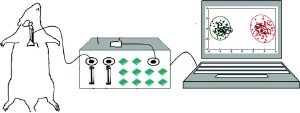Jun 10 2009
Scientists in Israel have identified the key substances in exhaled breath associated with healthy and diseased kidneys -raising expectations, they say, for development of long-sought diagnostic and screening tests that literally sniff out chronic renal failure (CRF) in its earliest and most treatable stages. Their report is in the current issue of ACS Nano, a monthly journal.
 Scientists report advances toward an 'electronic nose' that could detect kidney disease. Credit: The American Chemical Society
Scientists report advances toward an 'electronic nose' that could detect kidney disease. Credit: The American Chemical Society
In the new study, Hossam Haick and colleagues point out that the blood and urine tests now used to diagnose CRF can be inaccurate and may come out “normal” even when patients have lost 75 percent of their kidney function. The most reliable test, a kidney biopsy, is invasive and may result in infections and bleeding. Doctors have long hoped for better tests for early detection of kidney disease.
The scientists describe tests of an experimental “electronic nose” on exhaled breath of laboratory rats with no kidney function and normal kidney function. The device identified 27 so-called volatile organic compounds that appear only in the breath of rats with CRF. The results presented in this study raise expectations for future capabilities for diagnosis, detection, and screening various stages of kidney disease,” they said, noting that the tests could detect patients with early disease who could be treated in ways that could slow its progression.